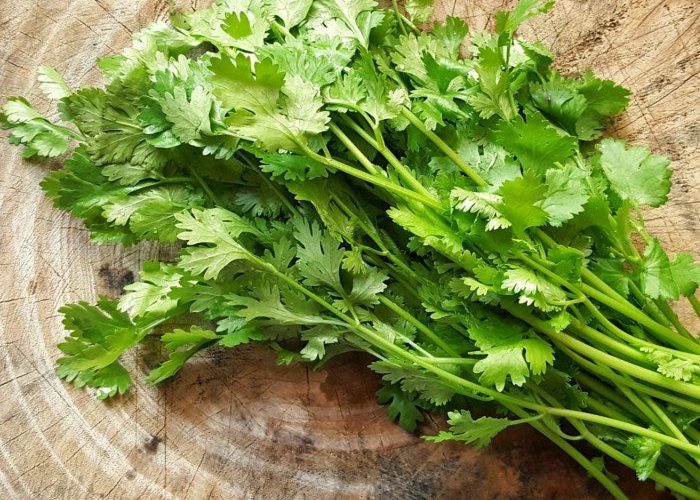[ Click here to buy Fresh DRUMSTICKS ]
Coriander Nutrition Facts
Its uses in global food preparation are only the tip of the iceberg. Unbeknownst to many people, coriander is packed with potential health benefits that most people completely miss when they toss this garnish into the garbage after eating their meal. It has eleven components of essential oils, six types of acids (including ascorbic acid, better known as vitamin C), minerals and vitamins; each having a number of beneficial properties.
Health Benefits of Coriander
Health benefits of coriander include:
Lowers Skin Inflammation
Cineole, one of the 11 components of the essential oils, and linoleic acid are both present in coriander, and they possess antirheumatic and antiarthritic properties. They help reduce the swelling that is caused by these two conditions. For other swelling conditions, such as swelling due to kidney malfunction or anemia, it is also seen to be effective to some extent, because some of the components in coriander help induce urination and the release of excess water from the body. The reduction in skin inflammation leads to a reduction in discomfort and an improvement in the appearance of the skin.
Treats Skin Disorders
The disinfectant, detoxifying, antiseptic, antifungal, and antioxidant properties of coriander are ideal for clearing up skin disorders such as eczema, dryness, and fungal infections.
Lowers Cholesterol Levels
The acids present in coriander, like linoleic acid, oleic acid, palmitic acid, stearic acid and ascorbic acid (vitamin C) are very effective in reducing cholesterol levels in the blood. They also reduce the level of bad LDL cholesterol deposition along the inner walls of the arteries and veins, which can lead to serious cardiovascular issues like atherosclerosis, heart attacks, and strokes. More importantly, this herb helps to raise the levels of healthy HDL cholesterol, which works as a preventative line of defense against a number of dangerous conditions.
Treats Diarrhea
The components of essential oils found in coriander such as borneol and linalool, aid in digestion, proper functioning of the liver, and bonding of bowels, while also helping reduce diarrhea. It is also helpful in curing diarrhea caused by microbial and fungal action since components like cineole, borneol, limonene, alpha-pinene and beta-phellandrene have antibacterial effects.
Coriander is also increasingly popular as a means of preventing nausea, vomiting, and stomach disorders. Its wealth of bioactive compounds means that new health benefits are always being discovered in this power-packed plant.
In addition to these health benefits, fresh coriander leaves are excellent appetizers to get your bowels prepared for a large meal.
Regulates Blood Pressure
Consuming coriander has been shown to positively reduce blood pressure in many patients suffering from hypertension. It enhances the interaction of calcium ions and acetylcholine, which is a neurotransmitter in the peripheral and central nervous system, and relaxes blood vessel tension; thereby reducing the chances of a number of cardiovascular conditions, including heart attacks and strokes.
Treats Mouth Ulcers
Citronellol, a component of essential oils in coriander, is an excellent antiseptic. Additionally, other components have antimicrobial and healing effects which keep wounds and ulcers in the mouth from worsening. They help speed up the healing process of ulcers and also prevent bad breath. Although not commonly used in mainstream products, coriander is often used as an antiseptic component in all-natural kinds of toothpaste. In fact, before the invention of toothpaste, people would chew on coriander seeds to reduce bad breath!
Prevents Anemia
It is high in iron content, which directly helps people who suffer from anemia. Low iron content in the blood can result in shortness of breath, heart palpitations, extreme fatigue, and a decrease in cognitive functions. Iron also benefits proper functioning of other organ systems, increases energy and strength, and promotes bone health.
Anti-allergic Properties
Multiple studies have shown coriander to have strong anti-histamine properties that can reduce the uncomfortable effects of seasonal allergies and hay fever (rhinitis). Its oil can also be used to reduce allergic reactions that are caused due to contact with plants, insects, food, and other substances. Internally, it can ward off anaphylaxis, hives, and dangerous swelling of the throat and glands. It’s never a bad idea to protect yourself against allergic reactions, especially since it is difficult to know what you might be allergic to until you come in contact with it for the first time!
Salmonella Protection
Salmonella is one of the most dangerous causes of foodborne illnesses in the world, so any natural way to protect against it is very important. Coriander has unusually high levels of dodecenal, a natural compound that is actually twice as powerful an antibiotic as the leading treatment for salmonella-based illness. By adding it to your normal diet, you protect your body from horribly uncomfortable, and even fatal illnesses relating to these deadly bacteria.
Improves Bone Health
As a rich source of calcium, coriander is of great value for people who want to protect the integrity of their bones. Calcium and other essential minerals found in coriander are integral components of bone regrowth and durability, as well as in the prevention of osteoporosis. Adding even a small amount of coriander to your diet can help keep your bones healthy and strong for years to come. Calcium is particularly present in the center leaves of coriander, so aim for that part of the plant if bone health is your focus!

